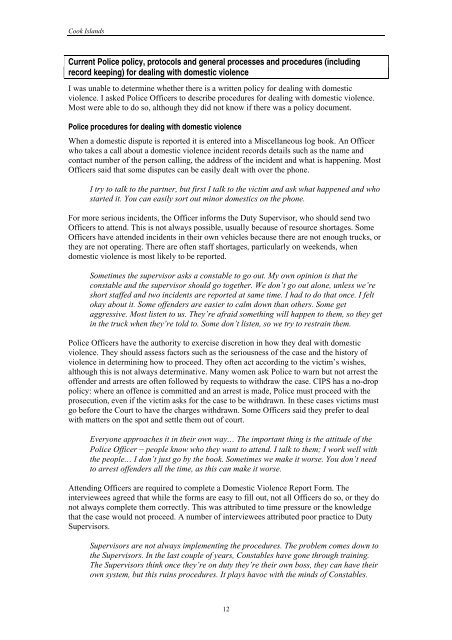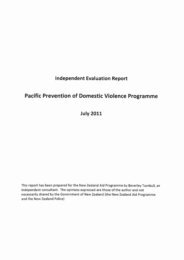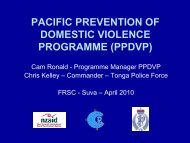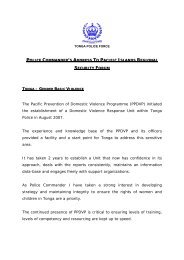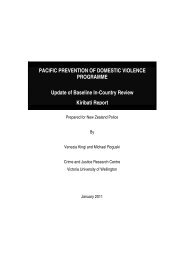Cook Islands - Pacific Prevention of Domestic Violence Programme
Cook Islands - Pacific Prevention of Domestic Violence Programme
Cook Islands - Pacific Prevention of Domestic Violence Programme
Create successful ePaper yourself
Turn your PDF publications into a flip-book with our unique Google optimized e-Paper software.
<strong>Cook</strong> <strong>Islands</strong><br />
Current Police policy, protocols and general processes and procedures (including<br />
record keeping) for dealing with domestic violence<br />
I was unable to determine whether there is a written policy for dealing with domestic<br />
violence. I asked Police Officers to describe procedures for dealing with domestic violence.<br />
Most were able to do so, although they did not know if there was a policy document.<br />
Police procedures for dealing with domestic violence<br />
When a domestic dispute is reported it is entered into a Miscellaneous log book. An Officer<br />
who takes a call about a domestic violence incident records details such as the name and<br />
contact number <strong>of</strong> the person calling, the address <strong>of</strong> the incident and what is happening. Most<br />
Officers said that some disputes can be easily dealt with over the phone.<br />
I try to talk to the partner, but first I talk to the victim and ask what happened and who<br />
started it. You can easily sort out minor domestics on the phone.<br />
For more serious incidents, the Officer informs the Duty Supervisor, who should send two<br />
Officers to attend. This is not always possible, usually because <strong>of</strong> resource shortages. Some<br />
Officers have attended incidents in their own vehicles because there are not enough trucks, or<br />
they are not operating. There are <strong>of</strong>ten staff shortages, particularly on weekends, when<br />
domestic violence is most likely to be reported.<br />
Sometimes the supervisor asks a constable to go out. My own opinion is that the<br />
constable and the supervisor should go together. We don’t go out alone, unless we’re<br />
short staffed and two incidents are reported at same time. I had to do that once. I felt<br />
okay about it. Some <strong>of</strong>fenders are easier to calm down than others. Some get<br />
aggressive. Most listen to us. They’re afraid something will happen to them, so they get<br />
in the truck when they’re told to. Some don’t listen, so we try to restrain them.<br />
Police Officers have the authority to exercise discretion in how they deal with domestic<br />
violence. They should assess factors such as the seriousness <strong>of</strong> the case and the history <strong>of</strong><br />
violence in determining how to proceed. They <strong>of</strong>ten act according to the victim’s wishes,<br />
although this is not always determinative. Many women ask Police to warn but not arrest the<br />
<strong>of</strong>fender and arrests are <strong>of</strong>ten followed by requests to withdraw the case. CIPS has a no-drop<br />
policy: where an <strong>of</strong>fence is committed and an arrest is made, Police must proceed with the<br />
prosecution, even if the victim asks for the case to be withdrawn. In these cases victims must<br />
go before the Court to have the charges withdrawn. Some Officers said they prefer to deal<br />
with matters on the spot and settle them out <strong>of</strong> court.<br />
Everyone approaches it in their own way… The important thing is the attitude <strong>of</strong> the<br />
Police Officer – people know who they want to attend. I talk to them; I work well with<br />
the people… I don’t just go by the book. Sometimes we make it worse. You don’t need<br />
to arrest <strong>of</strong>fenders all the time, as this can make it worse.<br />
Attending Officers are required to complete a <strong>Domestic</strong> <strong>Violence</strong> Report Form. The<br />
interviewees agreed that while the forms are easy to fill out, not all Officers do so, or they do<br />
not always complete them correctly. This was attributed to time pressure or the knowledge<br />
that the case would not proceed. A number <strong>of</strong> interviewees attributed poor practice to Duty<br />
Supervisors.<br />
Supervisors are not always implementing the procedures. The problem comes down to<br />
the Supervisors. In the last couple <strong>of</strong> years, Constables have gone through training.<br />
The Supervisors think once they’re on duty they’re their own boss, they can have their<br />
own system, but this ruins procedures. It plays havoc with the minds <strong>of</strong> Constables.<br />
12


